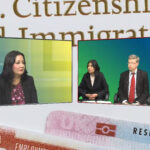California Attorney General Rob Bonta has taken a bold stand against the Trump Administration’s controversial policy of revoking student visas based on ideological grounds. In a recent amicus brief, Bonta, along with 19 other State Attorneys General, have challenged the constitutionality of these actions. Bonta describes the policy as unjustified, and a violation of fundamental rights including but not limited to First Amendment violations and Due Process concerns.
The Trump Administration has revoked hundreds of student visas primarily based on the student’s participation in protests or activities in support of Palestine. The Administration is also revoking the “student status” of international students based on the commission of minor crimes. The lawsuits seem to only address revocations/terminations based on ideological grounds.
One of the most publicized cases has been around Rumeysa Ozturk, a Ph.D. student at Tufts University, who was taken into custody for co-authoring an op-ed in the school newspaper. Secretary of State Marco Rubio announced the revocation of her visa, explaining, “we gave you a visa to come and study and get a degree, not to become a social activist that tears up our university campuses.”
The Trump Administration’s policy, rooted in Executive Orders 14161 and 14188, directs federal agencies to revoke visas for international students and faculty who engage in political speech deemed disagreeable by the administration. This has led to hundreds of visa cancellations, often without clear explanations or opportunities for students to contest the decisions. Secretary of State Marco Rubio has defended the policy, stating that the U.S. has the right to revoke visas of students who participate in activities like campus protests, which he claims disrupt public order.
The revocation of student visas has sparked widespread concern among educators, legal experts, and policymakers. International students play a crucial role in the U.S. economy, contributing billions of dollars annually through tuition, living expenses, and related spending. During the 2023–2024 academic year, over 1.5 million international students generated approximately $40 billion for the U.S. economy, and supported more than 368,000 jobs. These students also enrich academic discourse, strengthen research capabilities, and enhance global competitiveness.
The Ideological Deportation Policy targets noncitizen students and faculty based on their protected expressions and beliefs, including criticisms of government actions. It strips them of lawful immigration status and undermines constitutional rights like free speech. The brief argues the policy violates the First Amendment, leading to self-censorship among noncitizens and weakening academic freedom. It cites multiple court decisions affirming First Amendment protections for noncitizens. The brief urges the court to enjoin the policy to protect noncitizen residents, uphold constitutional principles, and safeguard academic institutions.
The lawsuit contends The Trump Administration weaponizes immigration enforcement by targeting residents of Amici States with lawful immigration status based on their protected expression and beliefs. On its face, the Ideological Deportation Policy violates the First Amendment’s protection of free speech, which the Supreme Court has repeatedly affirmed extends to noncitizen residents within the United States.
The Trump administration is creating pernicious dynamic whereby noncitizens may self-censor for fear of losing their immigration status, and campus community members are thereby deprived of hearing their voices. These orders empower the federal government to monitor, investigate, and deport noncitizens, not for actions that pose direct threats to national security of public safety, but for expressions of political opinion. The Executive Orders thus direct the use of immigration laws to police dissent and chill First Amendment-protected speech.
Attorney General Bonta’s brief emphasizes the importance of protecting the rights of international students, who not only contribute economically but also foster cultural exchange and innovation. The brief urges the court to enjoin the policy to protect noncitizen residents, uphold constitutional principles, and safeguard academic institutions. As the legal battle unfolds, the future of these students—and the broader implications for academic freedom and immigration policy—remain uncertain.
Disclaimer: The opinions and views expressed in this article/column are those of the author(s) and do not necessarily reflect the views or positions of South Asian Herald.






